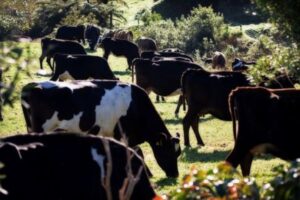Dairy Farming Marring New Zealand’s Rivers

New Zealand is facing unprecedented contamination levels in its rivers and waterways despite its national slogan of “100% Pure.” The culprit appears to be dairy farming, which is also the biggest benefactor of the ‘pure’ slogan.
Despite the mostly accurate bucolic imagery of New Zealand’s lush, rolling farmland, the Huffington Post reports “Its record on preservation of natural environments is among the worst in the world on a per capita basis.” And despite New Zealand’s “pure” claim, it’s the only OECD (Organisation for Economic Co-operation and Development) country “that does not produce a regular national report on its environment.”
The country’s Environment Ministry released data that found more than 60 percent of New Zealand’s rivers rated as “poor” or “very poor” in water quality, and were rated as “unsafe for swimming due to pollution.”
Fertilizers and animal waste runoff from dairy farms are to blame, cites the Post, “Unlike many other countries, New Zealand cows are kept on grassy pastures year-round, a major selling point for its $9 billion annual global dairy trade.” And farmers are adding more cows as demand increases, and they are creating more environmental issues as farms become more dense.
Adding to the impact the dairy industry is having on the country, the Huffington Post also reports food safety issues in New Zealand as well. The nation’s leading dairy producer, Fonterra, found a bacteria “that can cause potentially fatal food poisoning.” It’s been traced to ingredients sold to eight countries.
Keep in touch with Jill on Twitter @jillettinger
Image: dcysurger

